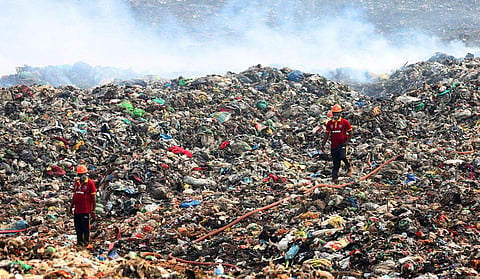

THIRUVANANTHAPURAM: Fourteen days after a fire broke out at the Brahmapuram waste treatment plant, Chief Minister Pinarayi Vijayan on Wednesday announced the setting up of a committee of experts to conduct a detailed probe into the reasons of the blaze and to suggest measures to avoid a repeat of such incidents.
In a statement made under Rule 300 in the assembly, the chief minister said the criminal case registered in connection with the fire that broke out on March 2 will be probed by a special investigation team. The vigilance and anti-corruption bureau will also conduct a probe into the activities of the plant.
The chief minister said the fire was put out completely on March 13. No serious health problems have been reported among the people following the fire and the toxic fumes that surrounded the area. He said 1,335 people had sought treatment in hospitals of which 128 were below 10 years of age and 262 were above 60 years. Around 21 people had to be admitted as in-patients after they developed uneasiness following the fire and smoke.
Govt initiates steps to obtain global expertise for waste treatment: CM
Pinarayi said a comprehensive health survey is being conducted at Brahmapuram and adjoining areas. A team of experts will study if any factors that could create long-term health issues are present in soil, water or the bodies of residents in the locality. An empowered committee has been tasked under disaster management act to ensure fool-proof waste treatment and timely implementation of a state-wide action plan towards the purpose.
“The additional chief secretary of the LSG department will monitor the activities on a daily basis. In addition to this, the ministers of LSG and Industries will convene weekly assessment meetings,” Pinarayi informed the assembly. On the state-wide comprehensive action plan for waste management, the chief minister said it will be implemented with people’s participation.
Scientific treatment of solid waste, building waste, bio medical and e-waste will be carried out. Rules relating to waste management will be strictly implemented and action taken against offenders. Pinarayi said organised protests motivated by narrow interests against waste treatment plants will not be tolerated. The activities as part of ‘Waste-free Kerala’ programme will be implemented in two phases.
While the first phase will be implemented from March 13 to May 31, the second phase will be implemented from September 1 to December 31. Treatment of waste at source, doorstep collection of non-biodegradable waste, largescale deployment of Haritha Karma Sena, creating waste-free public places and cleaning of water bodies are among the activities planned.
The chief minister said local bodies will provide the technical support for treatment of household biodegradable waste at source. War rooms will be set up at the local body, district and state level for the purpose. Enforcement teams and vigilance squads will be deployed and social audits will be conducted on the conduct of the action plan.
He said the government has initiated steps to obtain international expertise for waste treatment. A meeting will be held with representatives of the World Bank from March 21 to 23 for the purpose. The expertise of other agencies will also be sought. The chief minister said the crisis created by the Brahmapuram fire incident should be used as an occasion to attain the goal of ‘Clean Kerala’.
Dousing the fury
A look into the terms of reference set for the expert team constituted to probe the reasons behind the blaze